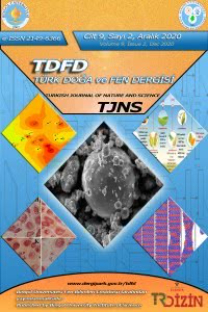Polipropilen Liflerin Perlit Esaslı Geopolimerlerin Mekanik Davranışına Etkisi
Altyapı çalışmaları dünya çapında büyüdükçe, Normal Portland Çimento (NPÇ) talebi de katlanarak artmaktadır. Çalışmalar, bir ton çimento üretiminin, kireç taşının kalsinasyonu ve fosil yakıtın yanması nedeniyle bir ton CO2' i atmosfere saldığını ortaya koymuştur. Çimento üretimi son derece enerji-yoğun ve önemli miktarda doğal kaynak tüketen bir süreçtir. Davidovits (1978), bağlayıcıların, alkali sıvının uçucu kül, yüksek fırın cürufu, pirinç kabuğu külü gibi alümino-silikat materyalleri ile polimerik reaksiyonu ile üretilebileceği yeni bir yol önermiştir. Ayrıca geopolimer kaya bazlı agregalarla güçlü bir kimyasal bağ oluşturma yeteneğine de sahiptir. Elyaf takviyeli geopolimer, mukavemet özelliklerini geliştirmek amacıyla, mikro takviye olarak, karışımına fiberlerin sokulduğu, görece yeni bir kompozit malzemedir. Bu çalışma, malzemenin çevreci özelliğini (yeşilliğini) arttırmak ve eğilme-basınç mukavemeti yüksek alternatif bağlayıcılar üretmek için perlit tabanlı geopolimerin mekanik davranışına polipropilen liflerin etkisini ortaya çıkarmaktadır.
Anahtar Kelimeler:
Geopolimer, Basınç Mukavemeti, Eğilme Mukavemeti, Polipropilen Lif
___
- 1. Canan F, KürümVarolgüneş F. Mimari Tasarımda Yerel-Ekoloji İlişkisi "Gökçeada Penceresinden Bakmak", Local-Ecological Relation in Architectural Design "From The Viewpoint of Gökçeada". Yapı dergisi. 2017;422:122-7.
- 2. Komnitsas KA. Potential of geopolymer technology towards green buildings and sustainable cities. Procedia Engineer. 2011;21:1023-32.
- 3. Davidovits J. Geopolymers - Inorganic Polymeric New Materials. J Therm Anal. 1991;37(8):1633-56.
- 4. Scrivener KL, Kirkpatrick RJ. Innovation in use and research on cementitious material. Cement and Concrete Research. 2008;38(2):128-36.
- 5. van Deventer JSJ, Provis JL, Duxson P. Technical and commercial progress in the adoption of geopolymer cement. Miner Eng. 2012;29:89-104.
- 6. Rockstrom J, Steffen W, Noone K, Persson A, Chapin FS, Lambin EF, et al. A safe operating space for humanity. Nature. 2009;461(7263):472-5.
- 7. Kamseu E, Cannio M, Obonyo EA, Tobias F, Bignozzi MC, Sglavo VM, et al. Metakaolin-based inorganic polymer composite: Effects of fine aggregate composition and structure on porosity evolution, microstructure and mechanical properties. Cement Concrete Comp. 2014;53:258-69.
- 8. Davidovits J. Fast-Curing Cement. Chem Eng News. 1989;67(27):4-5.
- 9. Davidovits J. Geopolymers and Geopolymeric Materials. J Therm Anal. 1989;35(2):429-41.
- 10. Gimeno D, Davidovits J, Marini C, Rocher P, Tocco S, Cara S, et al. Development of silicate-based cement from glassy alkaline volcanic rocks: interpretation of preliminary data related to chemical-mineralogical composition of geologic raw materials. Bol Soc Esp Ceram V. 2003;42(2):69-78.
- 11. Allahverdi A, Mehrpour K, Kani EN. Investigating the possibility of utilizing pumice-type natural pozzonal in production of geopolymer cement. Ceram-Silikaty. 2008;52(1):16-23.
- 12. Bondar D, Lynsdale CJ, Milestone NB, Hassani N, Ramezanianpour AA. Effect of adding mineral additives to alkali-activated natural pozzolan paste. Constr Build Mater. 2011;25(6):2906-10.
- 13. He JA, Zhang GP, Hou SA, Cai CS. Geopolymer-Based Smart Adhesives for Infrastructure Health Monitoring: Concept and Feasibility. J Mater Civil Eng. 2011;23(2):100-9.
- 14. Yadollahi MM, Benli A. Stress-strain behavior of geopolymer under uniaxial compression. COMPUTERS AND CONCRETE. 2017;20(4):381-9.
- 15. M. Torab-MostaediI* HG, M. Ghannadi-MaraghehI, S. J. AhmadiI and H. TaheriI. Removal of cadmium and nickel from aqueous solution using expanded perlite. Brazilian Journal of Chemical Engineering. 2010;27(2).
- 16. Cătănescu I, Georgescu M, Melınescu A. Synthesıs and Characterızatıon of Geopolymer Binders From Fly Ash. Scientific Bulletin, Series B: Chemistry and Materials Science. 2012;74(1).
- 17. Palomo A, Fernández-Jiménez A, Criado M. ''Geopolymers": same basic chemistry, different microstructures. Materiales de Construcción. 2004;54(275):77-91.
- 18. Bondar D, Lynsdale CJ, Milestone NB, Hassani N, Ramezanianpour AA. Effect of type, form, and dosage of activators on strength of alkali-activated natural pozzolans. Cement Concrete Comp. 2011;33(2):251-60.
- 19. Yadollahi MM, Demirboga R, Polat R. Effect of heat treatment temperature on ground pumice activation in geopolymer composites. Sci Eng Compos Mater. 2014;21(3):377-82.
- 20. Yadollahi MM, Benli A, Demirboga R. Effects of elevated temperature on pumice based geopolymer composites. Plast Rubber Compos. 2015;44(6):226-37.
- 21. Yadollahi MM, Benli A, Demirboga R. The effects of silica modulus and aging on compressive strength of pumice-based geopolymer composites. Constr Build Mater. 2015;94:767-74.
- ISSN: 2149-6366
- Yayın Aralığı: Yılda 4 Sayı
- Başlangıç: 2012
- Yayıncı: Bingöl Üniversitesi Fen Bilimleri Enstitüsü
Sayıdaki Diğer Makaleler
Ahmet Yesari SELÇUK, Haluk KEFELİOĞLU
Polipropilen Liflerin Perlit Esaslı Geopolimerlerin Mekanik Davranışına Etkisi
Mehrzad MOHABBİ YADOLLAHİ, Sadık VAROLGÜNEŞ
Adana İli Tufanbeyli İlçesi Meralarının Botanik Kompozisyonunun Belirlenmesi Üzerine Bir Araştırma
Selahattin ÇINAR, Rüştü HATİPOĞLU, Mustafa AVCI, İlker İNAL, Celal YÜCEL
Kendine Benzer Eğri Olmayan Bazı Özel Eğriler
İskender DEMİRKOL, Tahsin DAĞDELEN
Gençlerde Diyafragmatik Solunum Egzersizinin Bazı Mental ve Fiziksel Sağlık Düzeylerine Etkisi
Fatih ÇAKAR, Halil ŞİMŞEK, Aydın SEVER
Kültiğin ÇAVUŞOĞLU, Betül TAŞLI, Emine YALÇIN
Kanola (Brassica napus L.)’nın Hayvan Besleme Alanında Kullanılan Ürünleri ve Bu Ürünlerin Üretimi
